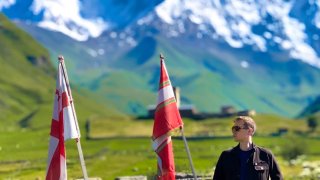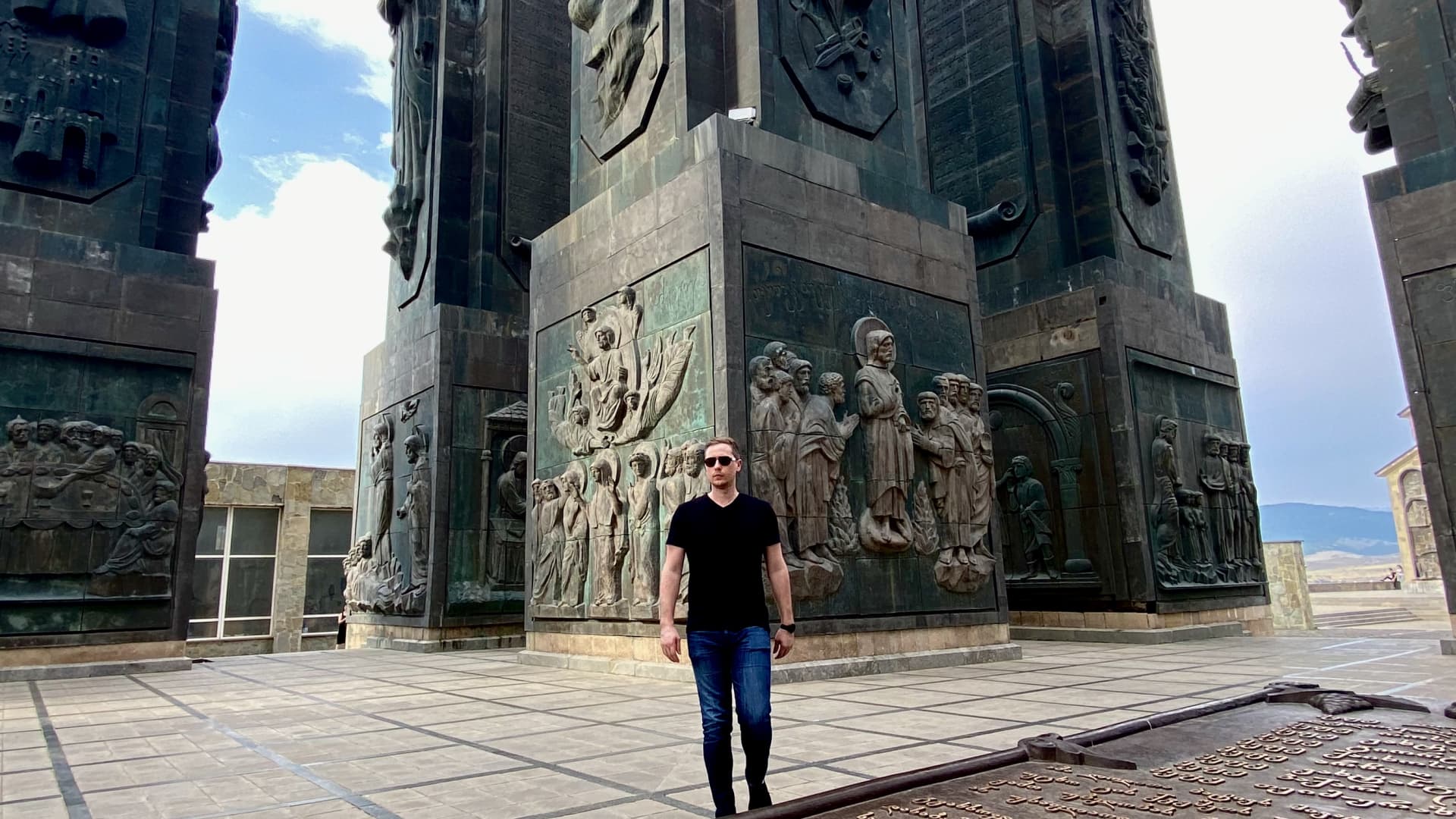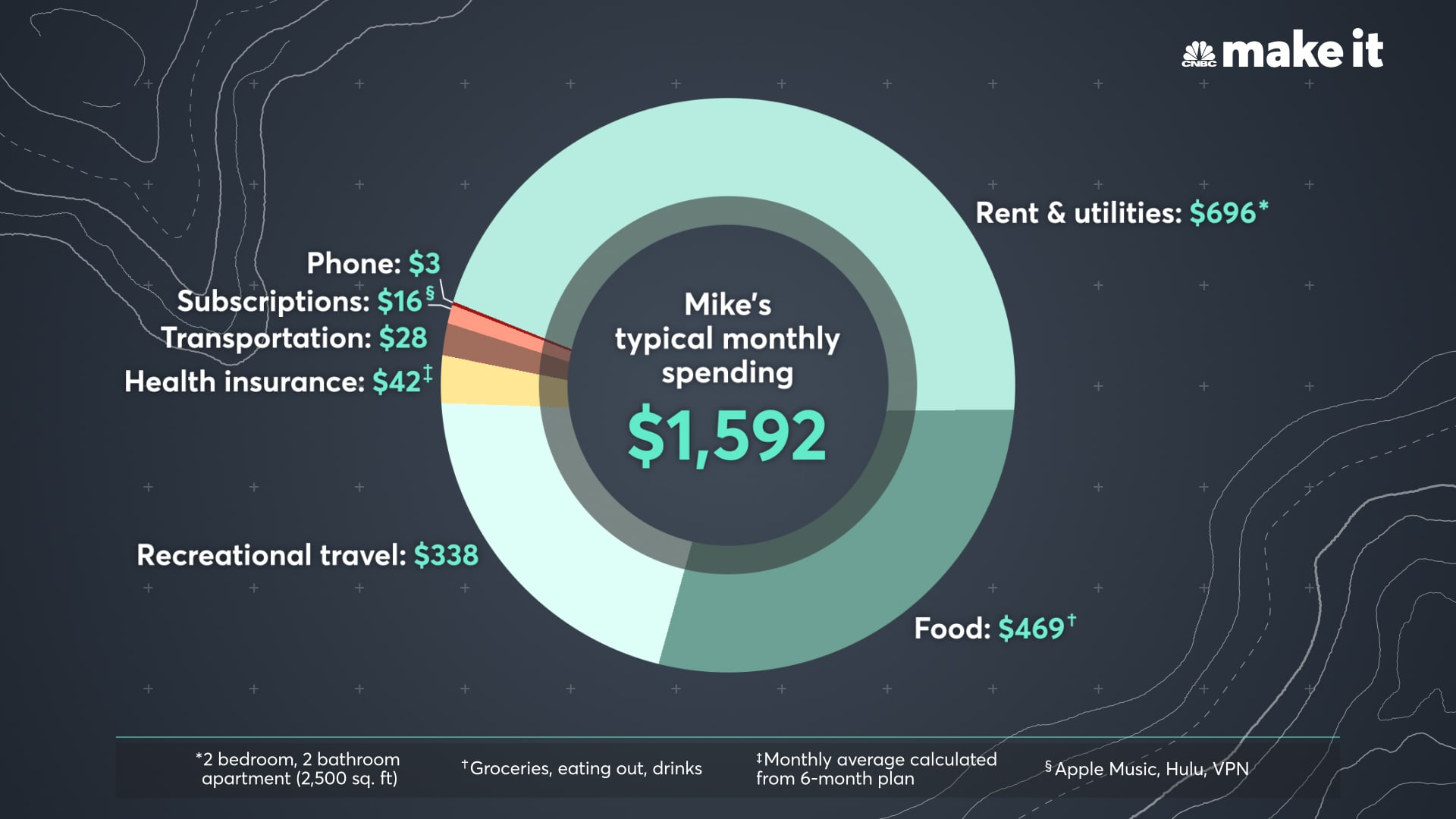
In 2020, Mike Swigunski was among millions of people in lockdown as the Covid-19 pandemic swept the globe. But instead of hunkering down with roommates or family, Swigunski was 6,000 miles away from home, alone in a foreign country.
Swigunski had only planned to visit Georgia, a small country that sits between eastern Europe and western Asia, for 30 days. But when Georgia closed its borders in early March to help curb the spread of the virus, the Missouri native was forced to extend his stay in the country's capital, Tbilisi.
As Swigunski recalls, however, he quickly fell in love with Tbilisi's old-world charm as well as its relaxed culture of good food and warm hospitality. Now, Swigunski, 33, is living and working from Tbilisi as a nomadic entrepreneur, a decision that has helped him live "a higher quality of life for a fraction of the cost," he tells CNBC Make It.
If he was living in the U.S., Swigunski adds, "I would have to be working a lot more … now, I'm semi-retired."
Get a weekly recap of the latest San Francisco Bay Area housing news. Sign up for NBC Bay Area’s Housing Deconstructed newsletter.
Tragedy, then wanderlust
Swigunski had always dreamed of traveling the world, and before he graduated from the University of Missouri in 2011, he found himself at a crossroads: pursue a traditional corporate job, or travel to Prague, where he was offered the opportunity to lead a group of students studying abroad.
Then, one month before graduation, Swigunski's mother died from breast cancer. "I was absolutely devastated," he says. "I was 22 years old, and I was confused on which path to follow … but I knew my mother would have wanted me to follow my dreams." He decided to follow his passion and booked a one-way ticket to Europe.
Money Report
Since then, Swigunski has visited over 100 countries, living and working in different locales for months, or years at a time: He's been a travel writer in Korea, an advertising manager in Australia and a marketing and sales manager in New Zealand, among other jobs.
Four years ago, Swigunski decided to monetize his expertise in remote working and travel. His business, Global Career, is an online resource of job boards, workshops, coaching and more where people can learn about entrepreneurship as a digital nomad.
"These services are helping other people by inspiring them to create a different journey or start their own global careers," he says. "I want to help other people become digital nomads in a faster path."

Living in Georgia is 'ten times' cheaper than the U.S.
Swigunski's annual income hovers between $250,000 and $275,000 — and thanks to tax benefits in Georgia, he gets to keep a lot more of his income than he would otherwise.
Georgia has a 1% tax rate for individual small business owners like Swigunski, and the U.S. has a tax benefit for expats that excludes up to $112,000 of income from being taxed.
"Running multiple businesses from Georgia is definitely a lot easier than if I was based in the U.S. and it mainly just comes down to the cost," he explains. "If I were trying to replicate my same infrastructure in the U.S., it would probably be around ten times more expensive."
Per Georgian law, citizens from 98 countries, including the U.S., can reside there for one full year without a visa, and apply for an extension once the year is up, which is how Swingunski is still living in Georgia.
His biggest expenses are his rent and utilities, which together are about $696 each month. Swigunski lives in a two-bedroom apartment with a private Italian garden that he found through a local realtor. "As soon as I saw this place, I fell in love," he says.
Here's a monthly breakdown of Swigunski's spending (as of February 2022):

Rent and utilities: $696
Food: $469
Transportation: $28
Phone: $3
Subscriptions: $16
Health insurance: $42
Travel: $338
Total: $1,592
One aspect of living alone that Swigunski learned he didn't enjoy early on is cooking — so once he moved to Georgia, he hired a private chef to come to his house six days a week and prepare meals for him, which costs about $250 per month.
A private chef might sound like a luxurious expense, but Swigunski says it's actually saved him a lot of money. "Without a chef, I'd be eating out a lot more and ordering takeout," he says. "But having a chef allows me to eat healthier and it saves me money and time that I can put toward my business instead."
'I'm happier living in Tbilisi than I would be living anywhere else'
Swigunski's favorite part of being a nomadic entrepreneur is that "every day looks different."
Each morning, Swigunski likes to enjoy a cup of coffee and read a book outside in his garden, then he tries to sneak in a quick meditation and workout before logging onto work.
He usually works from home because it's where he's "most productive," but sometimes he'll head to a coffee shop or co-working space with friends.
One of the biggest differences between living in Georgia and the U.S., Swigunski says, is that Georgians are "a lot more relaxed." "A lot of places don't even open until 10 a.m., and in general, Georgians are working to live, not living to work," he adds.
There's a phrase that describes Georgian hospitality: "A guest is a gift from God." That has held true for Swigunski, who notes that people are "very welcoming to foreigners" and have been "absolutely wonderful" in his experience.
But living abroad isn't as glamorous as it might seem on the surface. "It's not for everyone," Swigunski says. "There's going to be a lot of different variables that you won't be able to replicate from your old life of living in the U.S."
Because Georgia is still a developing country, Swigunski explains, "your electricity or water shuts off a little bit more here than other locations — this isn't happening every day, but it does happen a couple of times a year."
Although he feels homesick for his family and friends in the U.S. sometimes, Swigunski says he's "happier living in Tbilisi" than he would be living "anywhere else in the world," and plans to stay in Tbilisi for the foreseeable future.
"Would I ever live in the U.S. again? I don't want to speak in absolutes, I love America," he says. "But as of now, I just enjoy my life overseas a lot more than if I were going to live in the U.S."
Check out:
Sign up now: Get smarter about your money and career with our weekly newsletter






